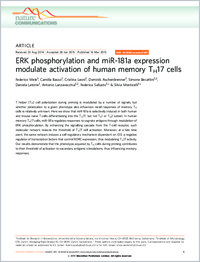ERK phosphorylation and miR-181a expression modulate activation of human memory TH17 cells
- Mele, Federico Institute for Research in Biomedicine (IRB), Faculty of Biomedical Sciences, Università della Svizzera italiana, Switzerland
- Basso, Camilla Institute for Research in Biomedicine (IRB), Faculty of Biomedical Sciences, Università della Svizzera italiana, Switzerland
- Leoni, Cristina Institute for Research in Biomedicine (IRB), Faculty of Biomedical Sciences, Università della Svizzera italiana, Switzerland
- Aschenbrenner, Dominik Institute for Research in Biomedicine (IRB), Faculty of Biomedical Sciences, Università della Svizzera italiana, Switzerland
- Becattini, Simone Institute for Research in Biomedicine (IRB), Faculty of Biomedical Sciences, Università della Svizzera italiana, Switzerland - Institute of Microbiology, ETH Zurich, Zurich, Switzerland
- Latorre, Daniela Institute for Research in Biomedicine (IRB), Faculty of Biomedical Sciences, Università della Svizzera italiana, Switzerland
- Lanzavecchia, Antonio Institute for Research in Biomedicine (IRB), Faculty of Biomedical Sciences, Università della Svizzera italiana, Switzerland - Institute of Microbiology, ETH Zurich, Zurich, Switzerland
- Sallusto, Federica Institute for Research in Biomedicine (IRB), Faculty of Biomedical Sciences, Università della Svizzera italiana, Switzerland
- Monticelli, Silvia Institute for Research in Biomedicine (IRB), Faculty of Biomedical Sciences, Università della Svizzera italiana, Switzerland
-
16.03.2015
Published in:
- Nature communications. - 2015, vol. 6, p. 6431
English
T helper (TH) cell polarization during priming is modulated by a number of signals, but whether polarization to a given phenotype also influences recall responses of memory TH cells is relatively unknown. Here we show that miR-181a is selectively induced in both human and mouse naive T cells differentiating into the TH17, but not TH1 or TH2 subset. In human memory TH17 cells, miR-181a regulates responses to cognate antigens through modulation of ERK phosphorylation. By enhancing the signalling cascade from the T-cell receptor, such molecular network reduces the threshold of TH17 cell activation. Moreover, at a late time point, the same network induces a self-regulatory mechanism dependent on ID3, a negative regulator of transcription factors that control RORC expression, thus modulating TH17 activity. Our results demonstrate that the phenotype acquired by TH cells during priming contributes to their threshold of activation to secondary antigenic stimulations, thus influencing memory responses.
- Language
-
- English
- Classification
- Medicine
- License
-
License undefined
- Open access status
- gold
- Identifiers
-
- RERO DOC 326868
- DOI 10.1038/ncomms7431
- ARK ark:/12658/srd1319054
- Persistent URL
- https://n2t.net/ark:/12658/srd1319054
Statistics
Document views: 149
File downloads:
- Texte intégral: 199
